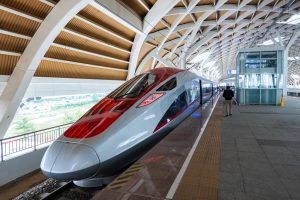Indonesia’s new sovereign fund Danantara is working on a debt restructuring plan for the China-backed Jakarta-Bandung High-Speed Railway, which has left the country with a heavy debt burden.
The $7.3 billion rail line, which links the capital Jakarta to the city of Bandung in West Java, began operations in October 2023. With a maximum speed of 350 kilometers per hour, the train, which is officially known as Whoosh, has cut travel time between the two cities from three hours to around 40 minutes.
While the rail line recorded 2.9 million passengers in the first half of this year, a 10 percent increase on the same period in 2024, the project has created a considerable debt burden for the Indonesian government.
Since its inception in 2015, the railway project has been spearheaded by PT Kereta Cepat Indonesia China (KCIC), a joint venture between a consortium of Chinese state-owned companies and a consortium of four Indonesian state-owned companies. Of the total estimated cost of $6 billion, 75 percent was contributed by a $4.5 billion loan from the China Development Bank, while the remaining 25 percent was contributed by Indonesian and Chinese shareholders in KCIC.
However, the project experienced a series of delays and cost overruns due to the COVID-19 pandemic and complications in land acquisition. In February 2023, the Indonesian and Chinese governments agreed on a cost overrun of 18 trillion rupiah (around $1.2 billion). According to an article by ThinkChina, this officially made the Whoosh the most expensive infrastructure project undertaken under the aegis of China’s Belt and Road Initiative, “more so than the China-Laos Railway, the Addis Ababa-Djibouti Railway, and the Mombasa-Nairobi Railway, all built by China, at a price range of US$4-6 billion each.”
While China set a 2 percent annual interest rate for the original portion of the loan, it has charged a higher 3.4 percent annual interest rate for the money borrowed to pay the cost overrun.
According to a report in the Jakarta Globe, Danantara’s head, Rosan Roeslani, told reporters on Tuesday evening that the agency was trying to find ways to change the terms to make the loans easier to pay back. “We are evaluating [the project]. If we carry out a corporate action, we completely take care of it [the debt], and not just postpone it,” the paper quoted Rosan as saying. “However, we will find ways on how we can restructure Whoosh’s [debt].” Rosan did not disclose the specifics of how Danantara would seek to reduce the debt burden, either by a reduction in the interest rate or the extension of the loan term.
The Jakarta-Bandung high-speed railway has the distinction of being Southeast Asia’s first fully-fledged high-speed railway. (The Laos-China Railway, another Chinese-backed project that began operations in late 2021, runs at a slightly slower speed.) It therefore occupies an important place in China-Indonesia relations, something that probably ensures that Indonesia will be able to negotiate a debt restructuring of some kind, but also probably imposes limits on how hard it can afford to push.
Meanwhile, President Prabowo Subianto is reportedly mulling plans to extend the line eastward to Surabaya, the capital of East Java. In late July, Coordinating Minister for Infrastructure and Regional Development Agus Harimurti Yudhoyono announced that the government is preparing a new regulatory framework for the extension of the line.
“President Prabowo has given clear instructions to expand the Jakarta-Bandung high-speed train line to Surabaya,” he said, according to the state news agency Antara. He said that Prabowo wished to integrate further the island of Java, and that “the key to this vision is to strengthen the Bandung-Surabaya corridor.”
































